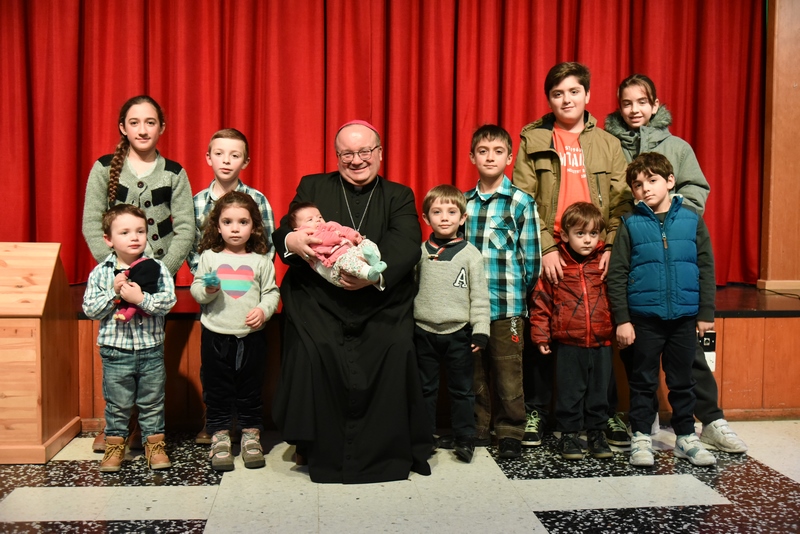-

-
On Sunday 22nd January 2017, Archbishop Charles J. Scicluna met with deaf persons, and had the opportunity to hear about their difficulties, their wishes and aspirations in order to feel included and partecipatory as full active members in the life of the Church.In his reactive comments, Archbishop Charles J. Scicluna requested the Deaf People Association Malta to make contact with the Seminary so that seminarians would be appraised on the realities facing deaf persons and enourage them to learn the Maltese Sign Language. He mentioned the importance that the Church offers the services of interpreters of the Maltese Sign Language during Cathecism classes and other special occasions. The Archbishop also shared his wish that the Church continues to develop services so that deaf persons feel included in whatever Church they attend mass. He also mentioned the importance that parishes become aware of deaf persons living in their community so that they can respond better to their needs. For example, for the blessing of families, the parish priest might be able to organise a day when he can take an interpreter with him during his visits to families with deaf persons. As for the Sacrament of Reconciliation the Archbishop highlighted that Church Law allows that in the absence of a priest who knows the Maltese Sign Language, the services of an interpreter may be used and, as in the case of the priest, he/she is also bound with the confessional secrecy.Steven Mulvaney, President of the Deaf People Association Malta said that in Malta there are 250 persons that use the Maltese Sign Language and are members of the Association. Obviously, there are different levels of deafness such as those who are hard of hearing and those who lose their hearing as a result of old age. In total it is envisaged that there are around 1,000 deaf people in our country.
Mr Mulvaney thanked the Archbishop who has graciously accepted the Association’s invitation to meet up with its members as well as for the support of the Church in Malta for the inclusion of deaf people within the Church. He referred to the Saturday evening Mass at the University of Malta Chapel where the Church actually pays for sign language interpreters so that deaf people are able to understand what is being said and become active participants.
As part of their wish list, he mentioned the need of more masses that are accessible to them, the need for visual screens to be set up in churches to highlight the readings or printed material from which they can at least follow what is being said. He praised the efforts of the Church to soon embark on a project for liturgy readings to be recorded in the Maltese Sign Language. It is his wish that in the near future these videos will be accessible on an App that one can access through internet on mobile during the mass itself. He also mentioned the importance for seminarians to be fully appraised with deaf culture and the needs of deaf persons. Seminarians should be given the opportunity to attend a basic course on the Maltese Sign Language as part of pastoral formation.
Mr Mulvaney also made reference to the need for services of interpreters of the Sign Language during Cathecism classes, preparations for the sacraments such as the First Holy Communion, Confirmation, Baptism and Holy Matrimony so that everyone can partake of the same formation.
Other deaf persons took part in the discussion. Keith Callus spoke of the necessity that there should also be a mass interpreted in Maltese Sign Language on Sunday mornings apart from the Saturday evening one. Natalino Psaila added that he would love to have masses broadcast on the national television station using the Maltese Sign Language. A mother of a deaf child said that the first problem she encountered was when her daughter started attending Museum classes. The first reaction of the cathecist was that there was no need for the child to attend these classes because the Parish Priest would administer the first Holy Communion anyway. The parent insisted that her daughter had the right like everyone else to attend cathecism classes. Infact with her help as well as that of the interpreter her daughter would be well prepared like everybody else for her first Holy Communion. She insisted that cathecists should take awareness courses on the needs of deaf persons and not take it for granted that these persons are understanding them.
The Archbishop said that during the upcoming meeting of the College of Parish Priests he will be bringing up the issue of the needs of deaf persons. He expressed his satisfaction that some of those present intimated that they wished to go on a Marian pilgrimage to Lourdes as a group. He encouraged them to organise this pilgrimage where they would have the services of interpreters of the Maltese Sign Language.
-
-
Photos: Id-Dar tal-Providenza






